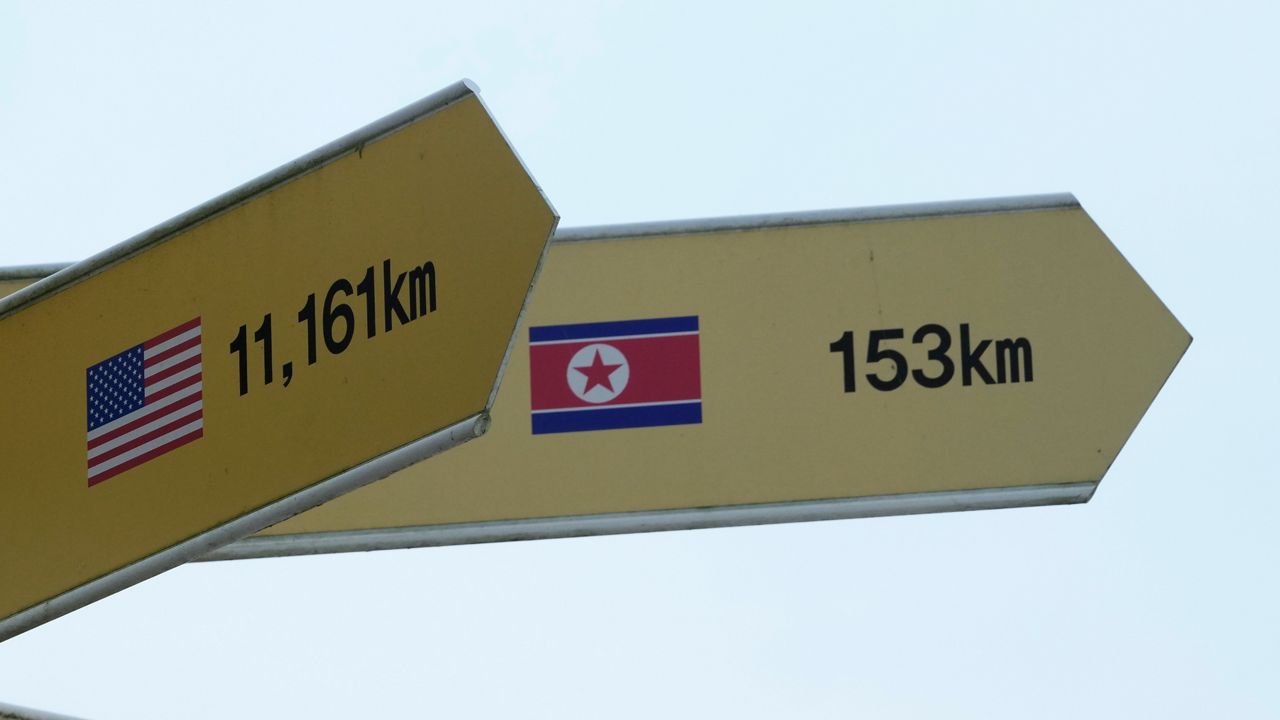A pink phone. A New York mission. Swedish diplomats. A North-South Korean hotline.
The United States and reclusive North Korea have no diplomatic ties — but they still have ways to contact each other. An American official said Wednesday that the U.S. government had reached out to the North as it tries to discuss a U.S. soldier who dashed into North Korea during a tour of a border area this week. The North has not yet responded, according to the U.S.
Here's a look at possible channels the rivals could use to discuss Pvt. Travis King, the first American held in North Korea in nearly five years.
___
PINK PHONE
One of the most reliable ways for the U.S. to reach North Korea is via a light pink-colored, touch-tone phone at the U.S.-led U.N. Command at the Korean border village of Panmunjom, the place where King bolted into the North on Tuesday. The telephone line connects the liaison officers from each side — whose offices are reportedly only 40 meters (130 feet) apart.
State Department spokesperson Matthew Miller said Wednesday that the Pentagon reached out to its counterparts in the North’s Korean People’s Army but “those communications have not yet been answered.”
Miller didn’t elaborate. But observers say the U.S. likely used the “pink phone.”
In January, the U.N. Command tweeted that it had maintained "24/7/365" contact with the North's army throughout 2022.
"Talking via the ‘pink phone,’ we passed 98 messages & held twice-daily line checks for timely & meaningful information exchange,” it said.
Moon Seong Mook, a retired South Korean brigadier general, said North Korean liaison officers appear to not be answering the calls made by the U.N. Command at the order of their higher-ups.
When North Korea previously suspended that telephone line, U.N. officers used a megaphone, Moon said.
The exact motive for King’s border crossing is unclear. He was convicted of assault in South Korea and could be discharged from the military and face other potential penalties.
___
NEW YORK MISSION
Miller said the U.S. retains a number of channels to send messages to North Korea.
One of those is North Korea’s mission to the U.N. in New York that has provided a back-channel negotiation option for the two countries, serving as a kind of substitute embassy since they don't have embassies in each other’s capitals.
The mission played an important role in working out details for the high-stakes summitry between North Korean leader Kim Jong Un and then-U.S. President Donald Trump in 2018-19. At the start of their second summit in Vietnam, both Kim and Trump said they supported the opening of a U.S. liaison office in Pyongyang, but the idea was shelved after their diplomacy broke down.
___
SWEDISH EMBASSY
Sweden, which does have relations with the North and an embassy in Pyongyang, has offered consular services for U.S. citizens, including those who had been detained in North Korea on charges of illegally entering the country or engaging in espionage acts.
Miller said State Department officials have reached out to Sweden on King’s case.
But a mediator role for Sweden could be complicated by the fact that its diplomats based in Pyongyang reportedly haven’t returned to the North since leaving the country due to its severe COVID-19 restrictions in 2020. Still, experts say the North’s Embassy in Sweden could be a channel for communications
__
OTHER HOTLINES
The rival Koreas have a set of phone and fax channels of their own to set up meetings, arrange border crossings and avoid accidental military clashes. But North Korea has been unresponsive to South Korean attempts to exchange messages via those channels since April at a time of heightened animosities over the North’s nuclear program.
Kim Yeol Soo, an expert at South Korea’s Korea Institute for Military Affairs, said communication could happen via a hotline between the two Koreas’ spy agencies. That line was reportedly previously active when others stalled. South Korea's Foreign Ministry said Thursday that Seoul and Washington were in contact, without elaborating.
___
PROSPECTS
Kim, the expert, said North Korea won’t respond to the U.S. outreach until it completes its investigation of King, and that will likely take at least two weeks. After the investigation, he said that a protracted negotiation between the U.S. State Department and the North Korean Foreign Ministry is expected.
While King’s custody could provide North Korea with a tool to wrest diplomatic concessions from the U.S., the country would also find it difficult to detain a low-ranking solider without much high-profile intelligence on the U.S. for an extended period, Moon said.
“If he expresses his hopes to return home, it would be burdensome for North Korea to hold him but they would still try to reach a deal with the U.S. to get what it wants,” Moon, now an analyst with the Seoul-based Korea Research Institute for National Strategy, said.
In the past, North Korea released U.S. civilian detainees after high-profile Americans such as former presidents travelled to Pyongyang to win their freedoms. Kim said similar steps could be required in King's case.
King’s entry to North Korea is an embarrassment to the U.S., said Chun In-bum, a retired lieutenant general who commanded South Korea’s special forces, noting that it came the same day that the United States took major steps toward boosting its security commitment to South Korea. It deployed a nuclear-armed submarine to South Korea for the first time in four decades and held the inaugural meeting of a bilateral nuclear consultative body with South Korea. North Korea test-fired two missiles on Wednesday, apparently in response.



